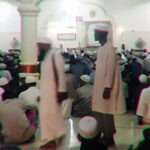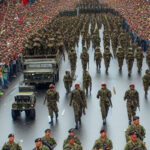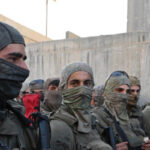The knife attack perpetrated on the morning of Thursday, June 8, in an Annecy park by a Syrian refugee that injured four children and one adult has reignited the debate on terrorism. The attacker, identified as Abdelmasih Hanoun (31) had initially been referred to as a Christian even based on an allegedly controversial exclamation during the incident ("in the name of Jesus Christ"). On June 12th, however, the website JihadWatch reported that the bomber's real name was Selwan Majid, a Muslim who arrived in Sweden from Turkey on a fake passport posing as a Christian. Verification is still ongoing. Four days before the carnage, the assailant had learned that France had rejected his application for asylum; could this have been the motive for his rampage?
Again in France but two days later, this time in Lille, an Algerian immigrant broke into a kindergarten and then tried to strangle a police officer. The incident found little media coverage, but the disturbing shadow of another attack on children, just as in Annecy, is undeniable.
In England, Nottingham, on June 14th, a 31-year-old attacker indicated by authorities to be from West Africa stabbedthree people to death (two university students and a janitor) and then tried to break into a hostel for the homeless before being arrested.
In Italy, things are no better; in fact, on Thursday evening, June 8th, in Milan, high school students who were celebrating the end of the school year on Via Benedetto Marcello were beaten up, even with rods, by about 20 North Africans who had arrived on the scene with the clear intent of assaulting them.
And how can we not remember the hijacking by a Senegalese immigrant of a bus with 51 children in March 2019? In that case, it was only by a miracle and thanks to the promptness of the police that a massacre was avoided, as the person in question set the vehicle on fire.
All these incidents have one common denominator: the aggressors' hatred of the host society. Be careful, because hatred has no color, but unfortunately the media response changes depending on perpetrators and victims. Consider if all these incidents had in fact occurred in reverse, with white assailants and North African victims. We would have seen continuous accusations against white European supremacism, terrorism, racism and so on. In the cases cited above, there is a clear hostility towards European society, even going so far as to deliberately target children, the most vile thing in the world, but no one has the courage to tell it like it is: these are attacks, disgusting hate crimes, revenge, acts of terror.
Terrorism experts Gus Martin and Fynwin Prager point to "hate crimes" as those crimes that are motivated by hatred or resentment toward a certain category (ethnicity, nationality, sexual orientation, race, etc...) and are devoid of a political agenda. They add, however, that in many cases it is difficult to distinguish between "hate crime" and terrorist attack because perpetrators of hate crimes may act as terrorists, fearing some ideological motivation [see Martin, Prager, Terrorism – An International Perspective (Sage, 2019). Pp. 24-25]. In addition, the emergence of so-called lone wolf attackers (who are active on their own but without necessarily being without connections to other elements) have further complicated the issue, since in no case is a traditional organizational structure behind the perpetrator necessary anymore.
Following, however, the definition of terrorism by Prof. Marco Lombardi, an expert on terrorism and director of Itstime at the Catholic University of Milan, namely, "An act of terrorism is such because of the effects it produces, not because of the reasons that motivate it," then we could also interpret the episodes mentioned initially as terrorist actions because they do in fact generate terror among the population. People are afraid to send their children to school (just as happened in Israel in the 1990s), they are afraid to walk down the street, because there is someone that hates them, and that is ready to strike. At this point definitions become secondary, because whether it is hate or terrorism, the result is the same, terror, violence, death, and this cannot be tolerated, regardless of who it is that is striking.
Researcher of Centro Studi Politici e Strategici Machiavelli. Graduated in Sociology (University of Bologna), Master in "Islamic Studies" (Trinity Saint David University of Wales), specialization in "Terrorism and Counter-Terrorism" (International Counter-Terrorism Institute of Herzliya, Israel). He is senior analyst for the British Islamic Theology of Counter Terrorism-ITCT, theItalian Team for Security, Terroristic Issues and Managing Emergencies (Catholic University of Milan) and the Kedisa-Center for International Strategic Analysis. Lecturer for security managerlaw enforcement and post-degree courses, he has been coordinator for Italy of the European project Globsec. “From criminals to terrorists and back” and is co-founder of Sec-Ter- Security and Terrorism Observation and Analysis Group.









Scrivi un commento